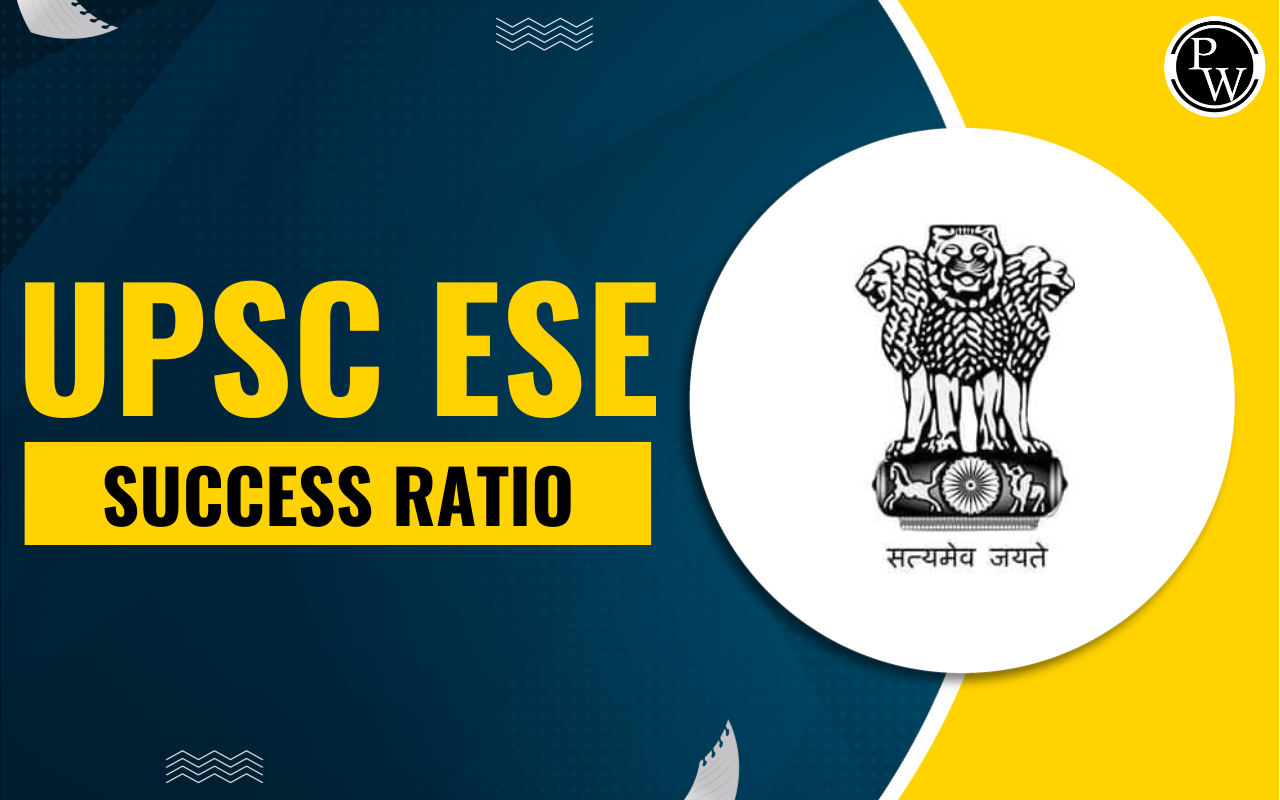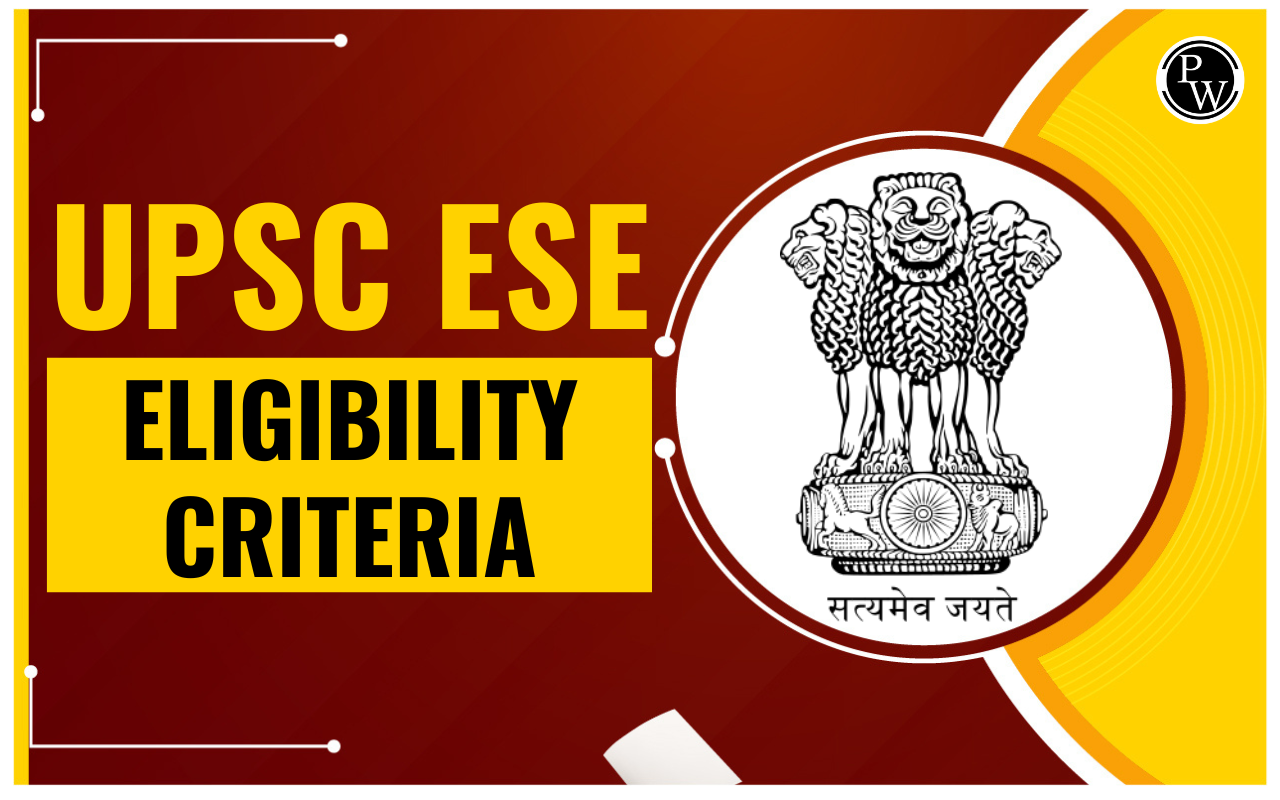
UPSC ESE vs PSU Jobs: Many aspirants, especially engineering graduates, often find themselves at the UPSC ESE vs PSU Jobs crossroads. While both options, the UPSC Engineering Services Examination and jobs at Public Sector Undertakings are quite popular among youth, many aspirants still can't decide whether they should go for the UPSC ESE or PSU Jobs.
Therefore, to help aspirants stuck at the UPSC ESE vs PSU Jobs crossroads, this article aims to shed light on a detailed comparison between the two. So, keep reading to learn more about UPSC ESE vs PSU Jobs.
UPSC ESE vs PSU Jobs
Engineering graduates can choose the UPSC ESE and PSU Jobs for a promising career in the technical specialization. Choosing the best one among both depends on the individual's choice, career aspirations, knowledge, and skills. The UPSC ESE is usually considered the best choice over PSU Jobs as it offers a prestigious Grade A position in reputed departments. While PSU Jobs also offers a lucrative salary structure and prominent job roles in the technical disciplines.
Aspirants must analyze their interests and priorities to compare both options and select the best one for them. If you wish to secure a respectable and highly reputed government job then you must opt for UPSC ESE as the best choice. You must refer to this article to make a well-informed decision about UPSC ESE and PSU Jobs.
UPSC ESE vs PSU Jobs - Which is Best?
Both UPSC ESE and PSU jobs remain the most sought-after career options for engineering graduates in India, as both offer reputable and well-paying employment. However, preparing to achieve both at the same time can be challenging. Therefore, knowing which one to target from the UPSC ESE vs PSU jobs can significantly boost applicants chances of succeeding.
Applicants who qualify for the UPSC ESE examination are offered job opportunities that require not just technical expertise but also administrative responsibility, allowing for a comprehensive understanding of governance.
On the other hand, PSU jobs are tied to a corporate environment, offering a mix of technical and managerial roles, as well as exposure to both engineering and business aspects. Let’s take a look at UPSC ESE vs PSU jobs individually.
Also check: What Is the Good GATE Rank for PSU Jobs?
What is the UPSC Engineering Services Examination?
The Engineering Services Examination (ESE), which is held annually by UPSC, aims to select engineers for technical managerial posts in four domains: Civil Engineering, Mechanical Engineering, Electrical Engineering, and Electronics and Telecommunications Engineering.
The UPSC ESE 2025 Notification has been released for 232 openings on the official website, upsc.gov.in. This presents an excellent opportunity for aspiring engineers to secure coveted positions in various government departments and organizations.
Suggested read: UPSC ESE Eligibility Criteria 2025
What are PSU Jobs?
PSUs, also known as Public Sector Undertakings, are state-owned organizations managed by either the Government of India or a state government. More than 50 PSU jobs are being offered to engineering graduates who fulfill the required eligibility criteria for the numerous Executive positions.
Furthermore, a number of well-known PSUs recruit through GATE Score in order to identify the most qualified applicants for vacant posts. Trainees, Technicians, Managers, Executives, Chartered Accountants, Company Secretaries, Heads, and Officers are the general positions that engineering graduates execute in PSU jobs.
Public Sector Undertakings (PSUs) are broadly classified into three categories: Maharatna, Navratna, and Miniratna PSUs. Check out a few examples of prominent PSUs among many in the table below.
| Prominent PSUs in India | |
| Maharatna PSUs | |
| Bharat Heavy Electricals Limited (BHEL) | National Thermal Power Corporation (NTPC) Limited |
| Coal India Limited (CIL) | Oil & Natural Gas Corporation Limited (ONGC) |
| Gas Authority of India Limited (GAIL) | Steel Authority of India Limited (SAIL) |
| Indian Oil Corporation Limited (IOCL) | Bharat Petroleum Corporation Limited (BPCL) |
| Navratna PSUs | |
| Bharat Electronics Limited (BEL) | Power Grid Corporation of India Limited |
| Container Corporation of India (CCI) Limited | Shipping Corporation of India Limited |
| Engineers India Limited (EIL) | Hindustan Petroleum Corporation Limited (HPCL) |
| Hindustan Aeronautics Limited (HAL) | Mahanagar Telephone Nigam Limited (MTNL) |
| Miniratna PSUs Category-I | |
| Airports Authority of India | Manganese Ore (India) Limited |
| Bharat Sanchar Nigam Limited | NHPC Limited |
| Indian Railway Catering & Tourism Corporation Limited | Northern Coalfields Limited |
| Indian Renewable Energy Development Agency Limited | ONGC Videsh Limited |
| HLL Lifecare Limited | Pawan Hans Helicopters Limited |
| Miniratna PSUs Category-II | |
| Bharat Pumps & Compressors Limited | National Film Development Corporation Limited |
| Broadcast Engineering Consultants (I) Limited | Rajasthan Electronics & Instruments Limited |
| HMT (International) Limited | Artificial Limbs Manufacturing Corporation of India |
Read: What Are the Navratna and Miniratna Companies in India?
UPSC ESE vs PSU Jobs - Detailed Comparison
To make an informed decision, it is important for aspirants to have an in-depth understanding of UPSC ESE vs PSU jobs. While both are great career options, they are different in terms of job positions, salary, scope, eligibility criteria, etc. Let's take a look at the UPSC ESE vs PSU Jobs detailed comparison to learn more.
UPSC ESE vs PSU Jobs - Eligibility Criteria
When it comes to comparing UPSC ESE vs PSU Jobs eligibility criteria, it is evident that engineering graduates are eligible for both. However, several of the top PSUs require GATE scores as a selection criterion in addition to the engineering degree. To learn more about UPSC ESE vs PSU Jobs eligibility requirements, refer to the table presented below.
|
UPSC ESE vs PSU Jobs - Eligibility Criteria |
|
| UPSC ESE Eligibility Requirements | |
| UPSC ESE Nationality | An applicant must be an Indian citizen by birth or a migrant from one of the countries listed below. Being a citizen of India, a subject of Nepal, a subject of Bhutan, a Tibetan refugee who arrived in India before January 1, 1962, or a person of Indian origins who migrated from specific nations with the aim of permanent residence in India are all valid nationalities. |
| UPSC ESE Educational Qualifications | A diploma in engineering, BE, B.Tech, or M.Sc. degree in relevant subjects from any recognized university or institution established by either an act of Parliament or declared to be deemed a university or UGC. |
| UPSC ESE Age Limit | The minimum age limit is 21 years, while the maximum age limit is set at 30 years. Relaxations may be provided as per government norms. |
| PSU Jobs Eligibility Criteria | |
| PSU Jobs Nationality | An applicant must be a citizen of India in order to apply for PSU jobs. |
| PSU Jobs Educational Qualifications |
Educational Qualifications for
PSU Recruitment Through GATE
:
|
| PSU Jobs Age Limit | The maximum age limit varies from one PSU job to another, although it is normally between 21 and 30 years old. Furthermore, age-limit relaxation for reserved categories may be allowed in accordance with government regulations. |
By comparing UPSC ESE vs PSU jobs, it is clear that having a diploma or degree in engineering is highly advantageous to applicants wishing to pursue careers in either the Union Public Service Commission's (UPSC) Engineering Services Examination (ESE) or in Public Sector Undertakings (PSUs).
An engineering qualification provides a good foundation for success in both ESE and PSU jobs, making it an important qualification for aspirants in these sectors.
UPSC ESE vs PSU Jobs Selection Procedure
The selection procedure for UPSC ESE vs PSU jobs is somewhat similar, except some public sector undertakings only select aspirants solely on the basis of their GATE scores, while others conduct a written examination followed by a personal interview. Discover the UPSC ESE vs PSU jobs selection procedure outlined below.
| UPSC ESE vs PSU Jobs Selection Process | |
| UPSC ESE | PSU Jobs |
Applicants are required to successfully clear the following stages to pass the UPSC ESE examination, each carrying specific marks:
|
PSU Recruitment Through GATE Selection Process:
|
UPSC ESE vs PSU Jobs Cut Off Marks
When comparing UPSC ESE vs PSU jobs, it is essential to understand how cut-off marks influence the outcomes of their respective selection processes. Cut-off marks serve as essential criteria, defining the minimum scores required for applicants to advance to the next stage or be selected for the final round.
Applicants aiming for UPSC ESE or PSU jobs must carefully understand and strategize around the cut-off marks in order to maximize their chances of success in these highly competitive choices.
Check out the previous year’s UPSC ESE vs PSU Jobs through GATE cut off details in the table presented below.
| UPSC ESE vs PSU Jobs through GATE Cut Off | |||||
| UPSC ESE Prelims Cut Off 2020 | |||||
| Branch | General | EWS | OBC | SC | ST |
| Electrical Engineering (EE) | 238 | 226 | 229 | 187 | 194 |
| Electronics & Telecommunication Engineering (ECE) | 245 | 226 | 245 | 205 | 202 |
| Mechanical Engineering (ME) | 262 | 255 | 250 | 214 | 202 |
| Civil Engineering (CE) | 238 | 238 | 238 | 202 | 227 |
| UPSC ESE Mains Cut Off 2020 | |||||
| Branch | General | EWS | OBC | SC | ST |
| Electrical Engineering (EE) | 578 | 548 | 550 | 496 | 510 |
| Electronics & Telecommunication Engineering (ECE) | 516 | 459 | 491 | 451 | 442 |
| Mechanical Engineering (ME) | 624 | 575 | 577 | 545 | 506 |
| Civil Engineering (CE) | 651 | 600 | 556 | 486 | 575 |
Also, Read: UPSC ESE Previous Year Cut Off
PSUs that recruit through GATE often release their own cut off marks for shortlisting applicants during their recruitment process for various PSU jobs. Check out the GATE Cut off for PSU Jobs , released by IIT Kanpur.
| GATE Paper Code | GATE Cut Off 2023 | ||
| General | OBC-NCL/EWS | SC/ST/PWD | |
| Statistics | 25 | 22.5 | 16.6 |
| Physics | 31.1 | 27.9 | 20.7 |
| CS | 32.5 | 29.2 | 21.6 |
| ECE | 29.9 | 26.9 | 19.9 |
| CE | 26.6 | 23.9 | 17.7 |
| IN | 34.8 | 31.3 | 23.2 |
| Electrical engineering | 25 | 22.5 | 16.6 |
| Mechanical Engineering (ME) | 28.4 | 25.5 | 18.9 |
| XE | 37.9 | 34.1 | 25.2 |
| CH | 32.10 | – | – |
Furthermore, each PSU may have its own set of requirements and preferences, so applicants must align their preparation strategies with the specific demands of the organizations to which they desire to apply.
UPSC ESE vs PSU Jobs - Salary Structure
A key factor affecting applicants' decisions between UPSC ESE (Engineering Services Examination) and PSU (Public Sector Undertaking) jobs is the salary structure. This pivotal aspect plays a central role in shaping the preferences and career choices of aspirants who wish to establish themselves in the engineering field. Therefore, this section is dedicated to the UPSC ESE vs PSU Jobs salary comparison.
| UPSC ESE vs PSU Jobs Salary | |
| UPSC ESE Officer Salary Structure | |
| Particulars | Details |
| Basic Pay | INR 15,600 to INR 39,100 Per Month (Approximately) |
| Grade Pay | INR 5,400 Per Month (Approximately) |
| Net Pay | INR 21,000 Per Month (Approximately) |
| House Rent Allowance | 30% of Net Salary + DA i.e. 30% of ( INR 21000 + INR 23730) = INR 13,419 Per Month |
| Dearness Allowance | 113% of Net Salary i.e. 113% of INR 21,000 = INR 23,730 Per Month |
| Transport Allowance | INR 6,600 Per Month (For Class 1 Cities) |
| In-Hand Salary | INR 64,749 Per Month (Approximately) |
Find more details here: IES Officer Salary
For PSU Jobs, the salary structure may vary for recruitments through GATE and without GATE. Check out the salary structure of both in the table outlined below.
| PSU Recruitment Without GATE- Salary Structure | ||
| PSU Name | Type of PSU | Salary Structure ( Approximately) |
| Coal India Limited (CIL) | Maharatna | INR 60,000 to INR 1,80,000 |
| Steel Authority of India (SAIL) | Maharatna | INR 60,000 to INR 1,80,000 |
| Bharat Petroleum Corporation Limited (BPCL) | Maharatna | INR 60,000 to INR 1,80,000 |
| Gas Authority of India Limited (GAIL) | Maharatna | INR 60,000 to INR 1,80,000 |
| Power Grid Corporation of India Limited (PGCIL) | Navratna | INR 60,000 to INR 1,80,000 |
| Hindustan Aeronautics Limited (HAL) | Navratna | INR 16,400 to INR 40,500 |
| National Mineral Development Corporation Limited (NMDC) | Navratna | INR 40000-3%-140000 |
| Power Finance Corporation Limited | Navratna | INR 40,000-3%-1,40,000 |
| National Aluminum Company Limited (NALCO) | Navratna | INR 60,000 to INR 1,80,000 |
| Airport Authority Of India Limited (AAI) | MiniRatna | Manager: INR 60,000 to INR 1,80,000 Junior Executive: INR 40,000 to INR 1,40,000 |
| Nuclear Power Corporation of India Limited (NPCIL) | MiniRatna | Level 10 of the Pay Matrix – 7th CPC (Rs.56,100/-) |
| Mineral Exploration Corporation Limited | MiniRatna | INR 60,000 to INR 1,80,000 |
|
PSU Jobs After GATE Salary (Approximately) |
||
| PSU Names | Type of PSU | Average Salary Package (Per Annum) |
| IOCL | Maharatna | Rs. 12,00,000 |
| NTPC | Maharatna | Rs. 18,00,000 |
| ONGC | Maharatna | Rs. 16,50,000 |
| CIL | Maharatna | Rs. 11,00,000 |
| SAIL | Maharatna | Rs. 10,00,000 |
| BHEL | Navratna | Rs. 13,00,000 |
| BPCL, HPCL | Navratna | Rs. 16,00,000 |
| PGCIL | Navratna | Rs. 20,00,000 |
| NALCO | Navratna | Rs. 11,00,000 |
| CEL | Navratna | Rs. 9,00,000 |
| GAIL | Navratna | Rs. 16,00,000 |
Read: PSU Salary Structure Inside India, Perks and Allowances
UPSC ESE vs PSU Jobs - Career Scope
Examining the career scope of UPSC ESE vs PSU jobs is essential for applicants considering these career pathways. This analysis gives future engineers significant insight into the various career possibilities and challenges that each path involves. Find the in-depth analysis of UPSC ESE vs PSU Jobs career scope in the table below.
| UPSC ESE vs PSU Jobs Career Scope | ||
| Particulars | UPSC ESE | PSU Jobs After GATE in India |
| Entry Position | Primarily employed by a government agency as an assistant executive engineer or assistant director. | Applicants are hired for executive and other managerial posts. |
| Promotion Opportunities | After 3 to 4 years of service, the employee will be eligible for promotion to executive engineer or director. | After 30 years of service, individuals can advance to the position of Senior General Manager. After 34 years of service, they get promoted to Managing Director or Chairperson. |
| Career Progression | Employees can progress to the level of Joint General Manager or Chief Engineer after 13 years. | There are several levels of promotion accessible, including Chief Engineer, AGM (Additional General Manager), and Senior General Manager. |
| Highest Promotion Level | After 34 years of outstanding performance, the greatest degree of promotion is to the role of Managing Director or the prestigious position of Chairperson. | Senior General Manager is an achievable promotion level after 30 years of service. |
| Scope and Job Satisfaction | Prominent positions within the government sector. Different roles all contribute to national growth. | Stable work, competitive pay packages, job stability, on-the-job training, and professional development. |
| Work-Life Balance and Benefits | Provides a sense of work security, yet can involve significant responsibility. | Provides job security, work-life balance, and appealing bonuses and benefits |
Also read: M.Tech vs PSU, Govt Job After GATE, Salary, Scope In India
Both are excellent government professions that are highly respected and honored, but it is up to the aspirant's preference. However, understanding an in-depth comparison of some of the most significant features, as explained above, of UPSC ESE vs PSU Jobs will help applicants make an intelligent decision that aligns with their career goals and ambitions.
Excel your UPSC ESE 2025 preparation journey with PW’s best UPSC ESE Online Coaching . The Physics Wallah offers well-structured study material, mock tests, e-books, and more at an affordable cost. Enroll Today to maximize your chance of success.
UPSC ESE vs PSU Jobs FAQs
Q. UPSC ESE vs PSU Jobs, which is better?
Q. Qualifying UPSC ESE or getting a PSU job—what is best?
Q. UPSC ESE vs PSU jobs: which offers more salary?
Q. UPSC ESE vs PSU नौकरियां, कौन सा बेहतर है?










